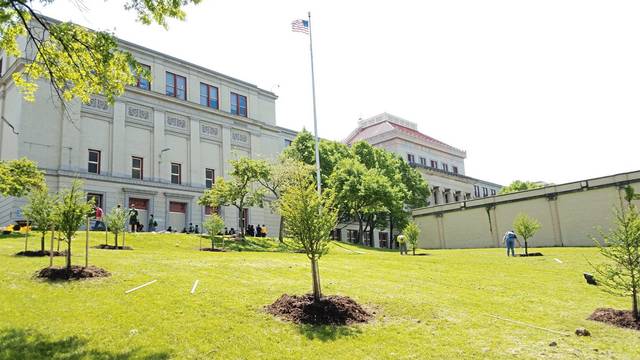Pittsburgh Public Schools on Wednesday released its detailed plan for remote learning, combining online lectures and assignments with packets of materials distributed by the district.
“Our ultimate goal in our service delivery model is really about being very flexible,” said Chief Academic Officer Minika Jenkins in a video news conference with reporters.
The district is using a “hybrid” model to provide learning opportunities to all students, Jenkins said. All lessons, online and printed packets, may be completed on a self-paced schedule.
Teachers will be available during select times to answer questions. They will also provide livestreamed lessons at specific times.
The lessons will still be recorded for students to return to if there is a problem with their access, and the district is providing suggested schedules to help students stay on track.
“The reason for that is to show that if I cannot get online at 9 a.m., how much time might my child need to work on reading or mathematics?” Jenkins said.
On computer, students access materials through Microsoft Teams.
For students not using computers, the district is distributing printed packets of material at 47 locations across the city. Each packet will include information for both parents and students, Jenkins said.
The packets include a QR code. When scanned by smartphone, it provides links to instructional videos and a step-by-step guide for completing the work.
If a student completes work in packet form, work can be submitted via email or text by taking a picture of the worksheets, Jenkins said.
Teachers will have office hours to help and communicate with students as they normally would, and tutors will be available remotely after hours.
The district is still finalizing its guidelines for grading and providing feedback for students.
There have been discussions of making classes pass/fail — as some area colleges have done in their own transitions to online learning. But David May-Stein, chief of School Performance, said Pittsburgh Public Schools is shying away from that approach.
“One of the things we want to absolutely convey for students and families is that we still have high expectations for students to engage and participate in their own learning,” said May-Stein. “One of the concerns we have with pass/fail is that it may lower a student’s participation and engagement if they feel they don’t have to put forth the same amount of effort to get an A.”
Jenkins added that grading will still be more flexible given the circumstances, with a greater emphasis on feedback for revision rather than punitive grades.
The district will provide special support services to students with special education needs and English language learners through a special training staff and tele-therapy lessons. Additionally, the district is partnering with outside partners like the Department of Human Services and the United Way to provide resources to students and families that are marginalized under the best of circumstances.
“Families that already have challenges, these challenges have been multiplied tenfold by the unexpected,” said May-Stein. “Our counselors, our social workers, our student services assistants that are school-based, will work directly with teachers and principals and assistant principals to help support students remotely.”
In the past several weeks, laptops have been distributed to students in need, with priority given to seniors. The district sent out a survey three weeks ago to assess students’ technology and internet access needs, and has purchased about 7,000 laptops to lesson the digital divide.
Superintendent Anthony Hamlet said he hopes the district can eventually have enough devices for every student in all grades — a benefit that would last beyond the pandemic, he said.
“Looking at learning losses and also looking at opportunity that students have, especially those that are marginalized or don’t have technology or internet access right now, having an online device and being able to extend learning at home helps support and further grow our students,” Hamlet said.
Theodore Dwyer, chief of Data, Research, Assessment and Accountability estimated that to put laptops in the hands of every student, the district would need to acquire between 7,700 and 10,000 more.
Seniors will begin instruction on Thursday, April 16. All grades will begin instruction on Wednesday, April 22. In total, students have gone more than a month without mandatory instruction while district leaders planned the curriculum and teachers underwent online training.
“Moving instruction for 23,000 students from brick and mortor classrooms to remote learning via online and instructional packets is no easy task,” Hamlet said. “It takes significant planning at any time, but particularly within a time when schools have been closed to curb the spread of covid-19.”








